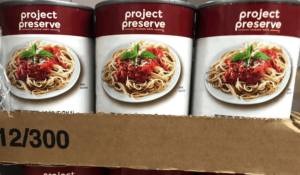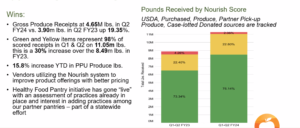When Anna Trautwein looks back on a program aimed at improving the health of diabetic food-pantry clients in Essex County, N.J., she sees some stand-out success stories: the handful of people who lost a significant amount of weight; the few who were able to wean themselves off some prescription drugs; the ones who were able to bring their blood sugar down to healthy levels.
Those are gratifying results for a 15-month program born out of the recognition that diabetes is a pervasive condition among low-income populations throughout the county. Initiated by the Summit Medical Group Foundation of Summit, N.J., where Trautwein works as the clinical director of programs and community wellness, the program takes a three-pronged approach to addressing diabetes by offering regular health screenings, health education, and access to fresh and healthy food. The Community Food Bank of New Jersey acts as an equal partner in the initiative through its provision of fresh produce and specially packed nutritious food.
Importantly, all the program’s activities take place at area food pantries during regular pantry hours. Co-locating with pantries — seven have been involved so far — was a deliberate step, Trautwein said, in keeping with the food-as-medicine movement. “We view food as an avenue to health and as medicine in and of itself,” she said. “So the best place we could partner with someone to do that was the food pantry.”
The Food, Health and Hope Diabetes program, which began over a year ago and officially wraps up in March, identified more than 200 food pantry clients who were diabetic or pre-diabetic and were interested in participating. Right away, these participants began receiving special food distributions from the Community Food Bank of New Jersey that included whole grain, fresh produce and other healthy selections.
They also had the opportunity to participate during pantry hours in at least nine one-hour educational sessions on the importance of good nutrition and related topics. Eye doctors and podiatrists from Summit Medical Group came to the pantries annually, allowing clients to learn about the impact of diabetes on their eyes and feet.
Every quarter, health care professionals from the foundation came to check blood sugar levels (an indicator of diabetes), as well as blood pressure and body mass (indicators of diabetes-related chronic conditions, hypertension and obesity). “We were going back to the same pantries every three months, so there was opportunity for relationship-building,” said Trautwein, who is also a certified registered nurse.
In addition to the individual success stories, Trautwein noted shifts in attitude and behavior as clients gained knowledge about their condition. Overall, however, she is not sure if the program as a whole will result in the ultimate goal of diabetes care, which is lowered blood sugar levels for most participants. (The results of the program, as monitored by an independent evaluator, will be released in April.) While Trautwein does not know what the evaluator will find, she predicted that “some who didn’t make changes will wash away the bigger individual successes.”
As it seeks to boost its overall success with a new round of participants at an expanded number of pantries starting in the spring, the foundation is already planning changes, most of which revolve around enhanced communication. For example, it will conduct an orientation, so participants better know what to expect and the level of commitment required. Working with the Community Food Bank of New Jersey, it will also require food pantries to submit an application to participate and will run an orientation session with pantry leadership so they have an in-depth understanding of what the program entails.
For now, Trautwein is pleased about the small successes, as well as the expanded knowledge and higher level of engagement many clients now have regarding their health. For a few clients, the screenings proved potentially life-saving, as they were identified as needing urgent care and sent immediately to health care facilities, one by ambulance!
One aspect of the program the foundation will not change is having a core group of health care professionals and volunteers who can establish ongoing, trusted relationships with clients through their continued presence. For the clients, “feeling valued is very big,” Trautwein said. “Those are the things that will move the needle.”
CAPTION: Anna Trautwein, RNC, of the Summit Medical Group Foundation, consults with a client at a food pantry in Essex County, NJ.









